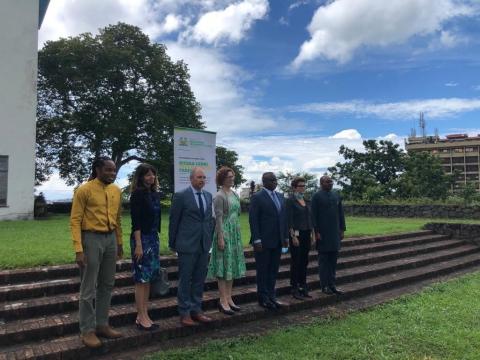By Mabinty M. Kamara
In a bid to ensure the sustenance of its flagship Free Quality Education (FQEP) programme, the government of Sierra Leone and its development partners have signed a multi-donor trust fund designed to raise funding for the scheme.
The pooled funding mechanism, which will be administered by the World Bank, was signed on Monday, October 5 at a ceremony at State House. Officials said the scheme is a five year project worth USD 66million, with critical components aimed at strengthening education policy, infrastructure and the general learning process.
The trust fund will be jointly supported by the World Bank, with a total funding of USD50million, the European Union with a total support of 13million Euros, and the government of Ireland through the Irish Aid, with a total sum of 5million Euro. The United Kingdom government is providing 2 million pounds.
World Bank Country Manager, Gayle H. Martin, said at the State House ceremony that the Bank’s contribution had already started supporting the government’s COVID-19 Response in the education sector, including the preparation for school reopening.
“The project is expected to benefit 2.4 million students, 75,000 teachers and members of school management committees and boards of governors in 9,300 primary and secondary schools. Over the medium term, it will support communities in promoting ownership and accountability,” she stated.
Head of Delegation of the European Union to Sierra Leone, Tom Vens, said that access to quality education is a key driver for sustainable development.
“The European Union has been and will remain at the forefront of supporting education worldwide. We cannot afford that the impact of the COVID-19 pandemic jeopardizes progress made so far in access to education. Being able to enjoy quality education is a basic right for every girl and boy in Sierra Leone. By joining hands, we can do more and better,” he said.
Vice President Mohamed Juldeh Jalloh in a statement said that the event showed the importance of partnership to the successes of the free education program. He added that the impact of the Free Quality Education is beginning to manifest itself.
“We have seen and continue to see a massive impact of the free quality education. Today, as politicians, when we move around the country, every time you go to a village or you go to a district, the first cry on the list is additional class rooms and additional teachers. Today, every Sierra Leonean kid wants to go to school. So that explains clearly that this Free Education project have had tremendous impact,” he said.
Minister of Finance, Jacob Jusu Saffa, said that the government had requested for support from the World Bank to support the Free Quality Education with emphasis on a multi-donor trust fund because it is the best platform for coordination and resource mobilization. He went on to note that the government is spending more in Education than initially budgeted.
Mr Saffa listed the areas in the sector in which the government is investing, including salaries for staff in all government run and government-assisted schools, which comprises about 11,168 schools, accounting for about 84% of government run and government assisted schools. He also noted that they also paid salaries for about 35,000 teachers, purchased buses for school children, teaching and learning materials including text books for core subject areas.
“In 2017, total government spending on education was Le659.7 billion. In 2018 it was 793.3 billion; in 2019 it rose further to 937.9 billion, and in 2020, as at end September, the figure is currently at 854.3 billion, and the figure is going to change by the end of October. So we are very sure that we will hit the 1 trillion spending on education. It is very critical in terms of spending. But what is more important, which we are now working on with the World Bank, is the inter-sectorial spending, where the spending is going? We try to have a clear idea as to where the spending is going in the education sector, to determine whether that is the most efficient way of spending resources,” he noted.
In his key note address, President Julius Maada Bio expressed gratitude to the partners for their efforts in making the free education a success. He noted that the Minister of Basic Education had been selected by the Advisory Board of the Global Monitoring Report, that comprises over 35 members the world over, to steer the advisory board discussion. He said this move was inspired by his commitment to inclusion in education.
Bio welcomed the children back to school after several months of sitting at home, despite the provision of alternative learning initiative through the radio teaching programs.
“Today we celebrate two historic firsts: First, we are one of the countries in the sub region to reopen schools for our children who are not in examination classes,” he said.
“Second, and most importantly, we are here to launch a multi donor trust fund that includes contribution from the World Bank, Irish Aid, European Union and DEFID. This is the first of its kind in addressing key deeper level of our manifesto promise of education reform in Sierra Leone,” he said.
Copyright © 2020 Politico Online








